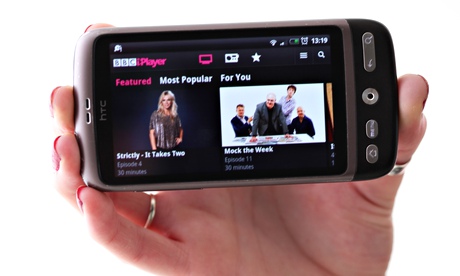
Channel 4 chairman Lord Burns has said the BBC should encrypt the iPlayer for licence fee payers only as a first step towards subscription with the licence fee unsustainable in the long term.
Burns criticised the corporation for being too wedded to the £145.50 licence fee and said it had ignored alternative forms of funding such as subscription - or “conditional access” - because it could “get away with it”.
The Channel 4 chairman was speaking on Thursday after BBC director general Tony Hall outlined his vision for the future of the BBC, saying he had “real confidence in the licence fee. Whatever reform people come up with, they need to answer that question, is there a better way [of funding it] than that 40p a day? I don’t think there is.”
But Burns said political downward pressure on the level of the licence fee meant it was unsustainable in the long term. He said the BBC should begin to look at alternative methods of funding, beginning with the iPlayer.
“You can either say you can only watch the iPlayer if you have a licence fee, or you can watch the iPlayer without a licence fee if you pay some money,” said Burns, speaking at the Future of the Licence Fee event in London on Thursday.
“This is the first big opportunity to move towards conditional access - no pay, no play - but they won’t even think about it because they think it is the first step towards subscription. They will not even think about it because they are so wedded to the licence fee.
“All the young people who are watching on their computers [without a licence fee] and don’t realise they are breaking the law, these are the first people who are showing us what is going to happen. The BBC have said they want the iPlayer to be at the centre of the future. Down the road, later in life, everything will be internet based.”
The BBC has fiercely resisted any moves towards subscription, saying it would cost £500m to implement and would lead to “first and second class” licence fee payers.
But Burns, who oversaw a review of the BBC’s governance a decade ago as an adviser to the then culture secretary Tessa Jowell, said: “The licence fee is effectively a tax … and I am very pessimistic about the ability of the BBC to fund itself long term through a tax. I think the political process is just too difficult.
“I spent the best part of 10 years in the Treasury, I know what it is like from that side of the fence. When it comes to the issue of what should happen to BBC income and the licence fee, the pressure is only one way.”
He added: “It is not so much about framing present strategy as where you think this is going to be in the long term. Instead of just taking it licence period by licence period and hoping you will get away with it again, it is to look further ahead. We should take opportunities as they emerge, and the iPlayer is the obvious first step.”
Burns said he did not expect the licence fee to disappear within the next 10 years because of the problems of adapting existing set-top boxes to take conditional access.
James Purnell, the BBC’s director of strategy and digital, said the BBC was “up for a discussion about the modernisation of the licence fee”.
But he warned against charging a fee for the online delivery of BBC services. “Online delivery is the future of television, if we were to start charging a subscription that would be locking ourselves into a ghetto of the past,” he said.
An estimated 500,000 UK homes do not have a television but watch BBC programmes on-demand on the iPlayer. Hall used a speech in February to say that the licence fee should be extended to iPlayer users without a TV set.
Burns’ comments were echoed by former Ofcom chairman, Colette Bowe, who also spoke at the event on Thursday.
“It seems like a no-brainer to have a look at conditional access funding for people using certain devices. I mean, why not?” she told the conference.
“I haven’t heard a single argument that conditional access for something like the iPlayer would not be a good thing to try. This is the moment the BBC needs to put itself ahead of the argument.”
Bowe also said that the BBC should do more in partnership with other public service broadcasters, such as Channel 4.
“What I don’t see from Tony Hall is any openness to alternative funding models [or] partnerships with other public service broadcasters,” she said.
Documentary maker Roger Graef warned against “tampering with the BBC and the licence fee at your peril”.
But Bowe said: “There isn’t a choice with tampering with the licence fee at the moment. The political pressure on licence fee funding is going to be intense. Whether we like it or not there is going to be downward pressure on the licence fee, I don’t think there’s a choice, you have to internalise that and say what do we do about it.”
• To contact the MediaGuardian news desk email media@theguardian.com or phone 020 3353 3857. For all other inquiries please call the main Guardian switchboard on 020 3353 2000. If you are writing a comment for publication, please mark clearly “for publication”.
• To get the latest media news to your desktop or mobile, follow MediaGuardian on Twitter and Facebook.

